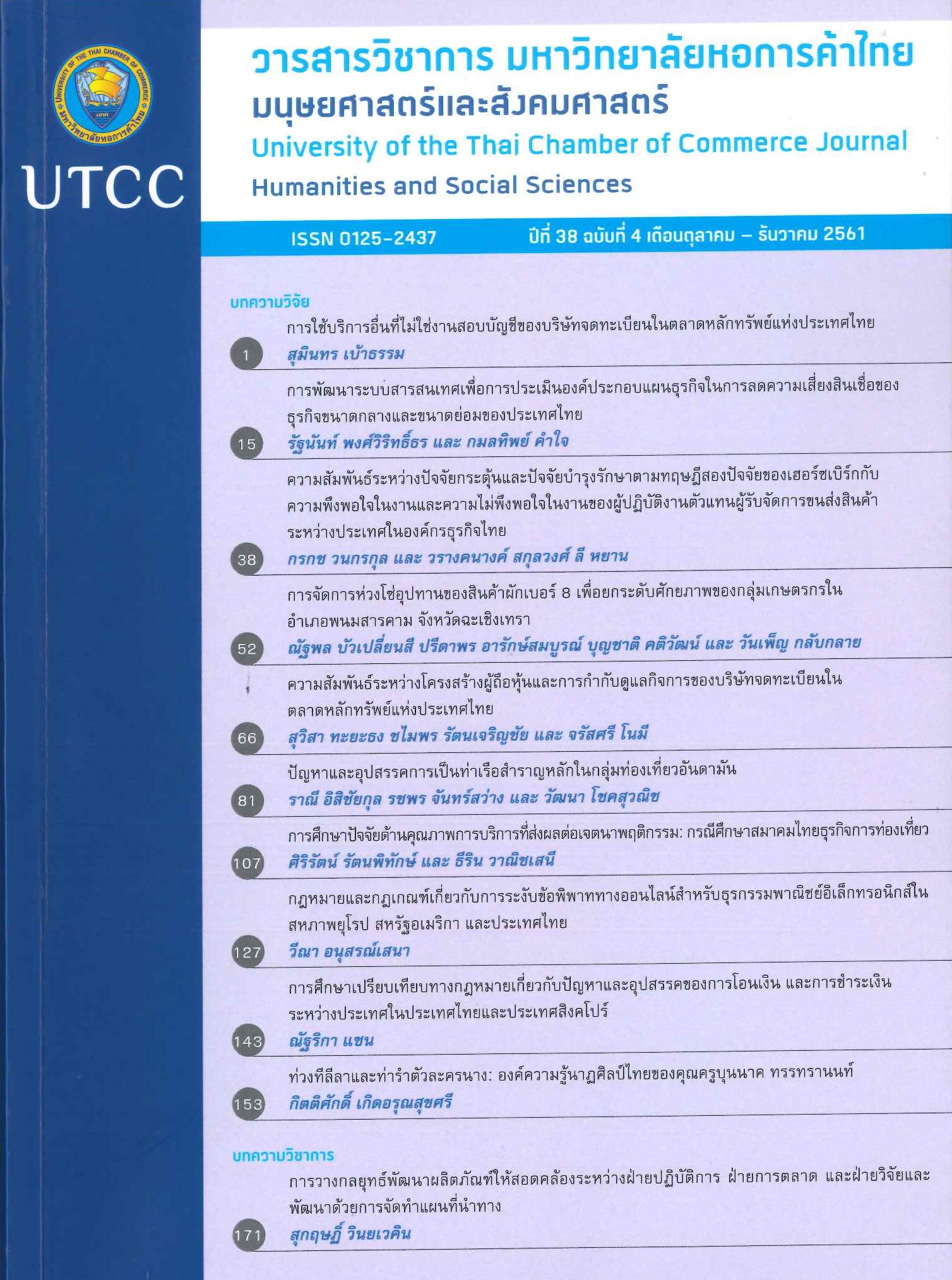Relationship between Herzberg’s Motivators and Hygiene Factors and Freight Forwarder Job Satisfaction and Job Dissatisfaction in Thai Company
Main Article Content
Abstract
This research aimed to studying the relation between two factors, motivators and hygiene factors, in Herzberg’s theory and job satisfaction and job dissatisfaction of Thai freight forwarders’ employees. The research results were found that the motivation factors - Achievement, Responsibility, Advancement/ Possibility of growth, and hygiene factors – Company policy and administration, Supervision-technical, Work conditions, Salary, Status, Security and Personal life, had the positive correlations with job satisfaction. The motivation factors – Achievement, Work Itself, Responsibility, and hygiene factors – Company policy and administration, Supervision-technical, Interpersonal relations, Salary, Status, and Security, had the negative correlations with job dissatisfaction
Article Details
ลิขสิทธิ์ของบทความ
ผลงานที่ได้รับการตีพิมพ์ถือเป็นลิขสิทธิ์ของมหาวิทยาลัยหอการค้าไทย ห้ามมิให้นำเนื้อหา ทัศนะ หรือข้อคิดเห็นใด ๆ ของผลงานไปทำซ้ำ ดัดแปลง หรือเผยแพร่ ไม่ว่าทั้งหมดหรือบางส่วนโดยไม่ได้รับอนุญาตเป็นลายลักษณ์อักษรจากมหาวิทยาลัยหอการค้าไทยก่อน
References
กัลยา วานิชย์บัญชา. (2549). สถิติสำหรับงานวิจัย. กรุงเทพฯ: โรงพิมพ์จุฬาลงกรณ์มหาวิทยาลัย.
ชูเกียรติ ชาตะรูปะ. (2557). ปัจจัยที่มีอิทธิพลต่อประสิทธิผลการปฏิบัติงานของสถานีตำรวจนครบาลนางเลิ้ง. (วิทยานิพนธ์ปริญญานิพนธ์มหาบัณฑิต ไม่ได้ตีพิมพ์) มหาวิทยาลัยราชภัฎพระนคร.กรุงเทพฯ.
ชูเกียรติ ยิ้มพวง. (2554). แรงจูงใจที่มีผลต่อการปฏิบัติงาน : กรณีศึกษาบริษัทบางกอกกล๊าสจำกัด โรงงานจังหวัดปทุมธานี. (วิทยานิพนธ์ปริญญามหาบัณฑิต ไม่ได้ตีพิมพ์). มหาวิทยาลัยราชมงคลธัญบุรี, ปทุมธานี.
สมาคมผู้รับจัดการขนส่งสินค้าระหว่างประเทศแห่งประเทศไทย. (2559) สมาชิกผู้รับจัดการขนส่งสินค้าระหว่างประเทศแห่งประเทศไทย. สืบค้นเมื่อ 1 กันยายน 2559, จาก
https://www.tiffathai.org/member/index.php?mtype2=&mtype3=&page=1&case1=&case2=&case3=&type_service1=&type_service2=&type_service3=&type_service4=&kword= &area=
สวัสดิ์ศรี จิรประเสริฐกุล. (2556). แรงจูงใจในการทำงานที่มีอิทธิผลต่อการปฏิบัติงานของพนักงานในกลุ่มโลจิสติกส์. วารสารการตลาดและการสื่อสาร. ปีที่ 1 ฉบับที่ 2 เมษายน-มิถุนายน 2556: 691-711
Hackman, J. R., & Oldham, G. R. (1980). Work redesign. Reading, MA: Addison-Wesley.
Herzberg, F. (1959). The Motivation to Work. New York: Wiley.
Mohan, G., & R. Mulla, Z. (2013). Openness to experience and work outcomes: Exploring the moderating effects of conscientiousness and job complexity,Journal of Organizational Behavior, 7(2), 18–36
Smerek, R. E., & Peterson, M. (2006). Examining Herzberg’s theory: Improving job satisfaction among non-academic employees at a university. Research in Higher Education, 48(2), 229-250.
Worlu, R. E. K. (2012). The validity of Herzberg’s dual-factor theory on job satisfaction of political marketers. African Research Review, 6(1), 39-50.


